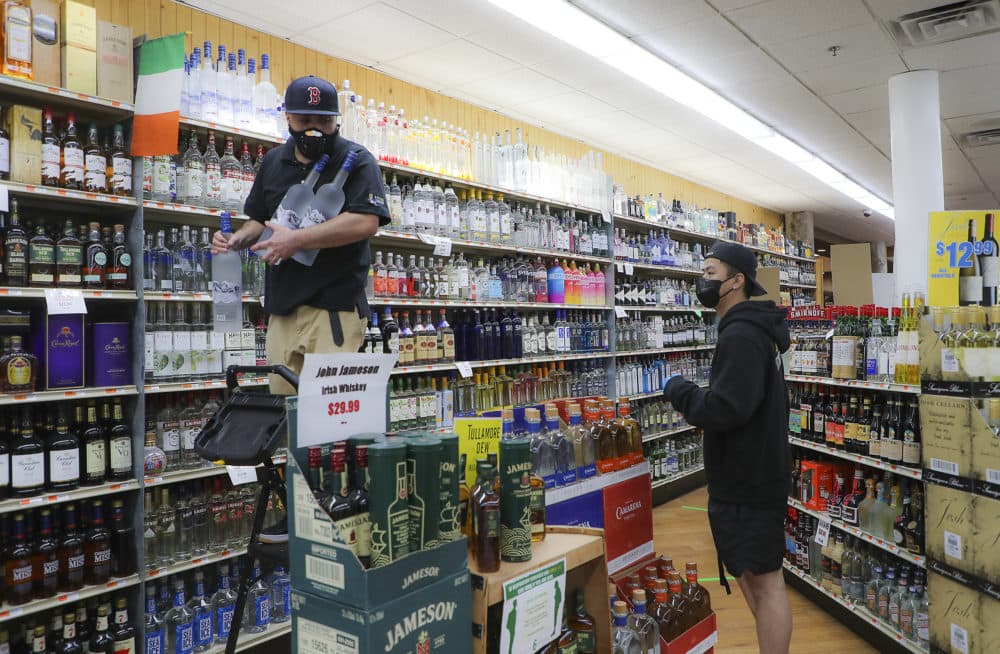Advertisement
What to know about Question 3, which could expand beer and wine licenses in Mass.

Retailers who sell, or want to sell, alcohol are closely watching Question 3 on the Massachusetts ballot. It asks voters to decide if the state should increase the number of alcohol licenses a single company can hold. Effectively, the measure would allow more stores to sell alcohol, especially beer and wine.
Right now, a state law intended to prevent monopolies allows individual retailers to own up to nine licenses to sell alcohol. So, if your company has nine storefronts, you could theoretically get enough licenses to sell alcohol at each location.
Various companies have long clamored to loosen this restriction, and in recent years, some have proposed eliminating the cap. As bigger retail chains secured alcohol licenses, concerns about mounting competition have risen among smaller package stores.
Many package stores are proponents of Question 3. They view the measure as a compromise of sorts: It meets some pent-up demand for more licenses, but protects smaller sellers by focusing primarily on permits to sell beer and wine — not hard liquor.
Many retail chains oppose the ballot measure. Some opponents, like the Massachusetts Retailers Association, argue the existence of any license cap stifles companies' efforts to expand in the market.
"Our general policy is we're free markets," said Ryan Kearney, the group's general counsel. "So let the government get out of the way, let businesses compete in an open and fair market, and then whoever offers the best product or the best offering or the best experience is the one that comes out on top."
The ballot question also proposes other changes: It moves to ban alcohol sales at self-checkout stations, adjust fines for violations by retailers, and allow businesses to accept out-of-state IDs.
A "yes" vote would trigger these changes simultaneously. Here's a rundown of each proposed change — and the debate around it — one by one.
How would Question 3 change beer, wine and hard liquor license caps?
Any business must have a license for each storefront where alcohol is sold.
There are two types of alcohol licenses in Massachusetts. One for beer and wine, and one often called "full" for all liquor, including hard alcohol, beer and wine. Today, every retailer is capped at nine full alcohol licenses and nine total licenses, which can be any combination of the two license types.
If it passes, Question 3 would double by 2031 the cap on the total number of licenses a retailer can own, from nine to 18. But, the measure also would lower the limit on full alcohol licenses, from nine to seven.
A company could reach these caps in two ways: It could obtain as many as 18 beer and wine licenses, or hold seven full alcohol licenses and 11 licenses to sell beer and wine only. (The proposal does grandfather in retailers who hold nine full alcohol licenses as of the end of this year; they can keep them all.)
Critics of the ballot measure say any attempt to reduce the maximum for full alcohol licenses is regressive. Some complained it took too long to raise the cap from three to nine in 2011.
Leading the opposition is Total Wine & More, a Maryland-based company with seven stores in Massachusetts. The company's local subsidiary, Massachusetts Fine Wines and Spirits, LLC, contributed more than $2 million in ad spending in early October, according to the state's Office of Campaign and Political Finance.
"Let’s call this what it is — protectionism," said Edward Cooper, a company spokesperson, in an email to WBUR. "The proponents of Question 3 have singled out Massachusetts package stores, especially Total Wine & More, for a reduction of licenses as a means of stifling competition. Less competition only harms consumers."
Advertisement
But proponents of the ballot question say the 2011 change hurt a lot of smaller liquor stores that historically held the majority of full liquor licenses.
"We should never have gone to nine to begin with," said Rob Mellion, executive director of the Massachusetts Association of Package Stores and a leader in the campaign to get Question 3 passed.
Hundreds of package stores have left the industry since 2011, he added. Mellion says his group believes limiting full licenses further could help stem small business losses, especially as liquor products, like spiked seltzers and pre-made cocktails, grow increasingly popular.
Still, he explained that supporters of Question 3 observed many grocery stores wanted beer and wine licenses, and appreciate that the proposal was tailored to address grocers' hopes.
Even with the expansion of beer and wine licenses, critics of the proposal say other alcohol regulations set by towns and cities will prevent a boom in new sellers.
In Massachusetts, municipalities set their own alcohol license caps, and opponents argue that altering state limits without changing local regulations makes Question 3 moot.
Kearney, with the Massachusetts Retailers Association, whose membership includes alcohol retailers of different sizes, said some chains find it hard to get licenses. They can't always be bought from a city or town; some municipalities put companies on a wait-list, and those waits can take about three years.
But Mellion says he's seen hundreds of licenses transferred from mom-and-pop stores to bigger stores in the last two years.
Large retailers, he said, "just want licenses handed to them."
How would Question 3 affect beer and wine retailer fines?
When a store illegally sells alcohol, such as to a minor, the state can suspend its alcohol license or accept a fee. The fines are calculated at 50% of total alcohol sales per each day that the company's license would have been suspended.
Under Question 3, 50% of a store's total gross sales — not just alcohol sales — would determine the fine, effectively making violations more costly.
Opponents call this an overreach and argue it would hurt competition by discouraging stores that sell food, gas and other goods from seeking alcohol licenses.
Supporters say this provision would ensure a fine hefty enough to deter chains, which boast larger profit margins, from repeat violations of the law.
How would Question 3 impact alcohol sales in self-checkouts?
Question 3 would ban all alcohol purchases at self-checkout stations. Current law neither allows nor prohibits self-checkouts.
Supporters, including public health advocates, say requiring face-to-face transactions would help ensure minors can't sneak illegal alcohol purchases.
While the Retailers Association of Massachusetts generally opposes Question 3, its members aren’t “wildly concerned” about this provision, according to Kearney.
How would Question 3 change what type of ID alcohol retailers can accept?
Currently, alcohol retailers can only accept Massachusetts drivers licenses, along with a few other federally issued IDs like passports, to check if someone is 21 or older. Under the proposal, alcohol sellers would be allowed to accept out-of-state drivers licenses. Because this would enable more sales, businesses support it.
However, some public health experts worry it will lead to more underage alcohol sales.
David Jernigan, health policy professor at Boston University's School of Public Health, said the fear is that young people will buy fake IDs from states where drivers' licenses are easier to illegally reproduce.
"For this portion of the measure alone, the public health community would oppose this measure," Jernigan said.
How did we get here?
The Massachusetts Package Stores Association is the most significant financial backer of the "yes" campaign with over a half million dollars in donations, according to the Massachusetts Office of Campaign Political Finance.
The group says the ballot initiative is a direct response to a recent move by a big retailer that package stores saw as a threat.
In 2019, Cumberland Farms, a regional convenience store chain, petitioned for a ballot question that sought to remove the caps on alcohol licenses for stores that sell food. The proposal never went before the voters, but it put small businesses on the defensive.
Package stores pushed for Question 3 because they "saw no alternative to get out ahead of large corporate interests," Mellion said.
Opponents, like the Massachusetts Retailers Association, say they understand some small businesses view Question 3 as a "compromise" to address their fears and the interests of larger companies. However, Kearney and his group argue many businesses do not feel this solution works for them.
"Unfortunately, it takes two to tango when it comes to compromise," he said.
Mellion, with the Package Stores Association, said he knows Question 3 isn't "everything that everyone wants." But, if it passes, he says it will satisfy some competitors while guaranteeing some security for smaller liquor stores.
Many voters are submitting ballots by mail now, and in-person early voting hours begin Saturday, Oct. 22. Election Day is Tuesday, Nov. 8.
